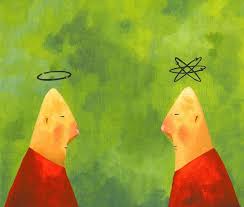
0
Liked
What Religion Gives Us (That Science Can’t)
The New York Times recently published an opinion piece by philosopher Stephen Asma with the above title. It was among the newspaper’s most trending stories and elicited thousands of comments.
“It’s a tough time to defend religion,” Asma acknowledges at the outset. “Respect for it has diminished in almost every corner of modern life — not just among atheists and intellectuals, but among the wider public, too. And the next generation of young people looks likely to be the most religiously unaffiliated demographic in recent memory.”
Polls for the last decade confirm Asma’s remarks, and I have no argument with his main premise, that religion gives people what science, and no other practice or system, can. And, that as a society, we need it. I disagree, however, with Asma’s notion that religion is “irrational” and useful only for its emotional rewards.
His Body Made Whole
Asma, who teaches at Columbia College in Chicago, writes about his encounter with one of his students and how it changed his view on the value of religion. The student’s older teenage brother had been stabbed to death, his mother had a “mental breakdown” and “would have been institutionalized if not for the fact that she expected to see her slain son again, to be reunited with him in the afterlife where she was certain his body would be made whole.
Asma, who teaches at Columbia College in Chicago, writes about his encounter with one of his students and how it changed his view on the value of religion. The student’s older teenage brother had been stabbed to death, his mother had a “mental breakdown” and “would have been institutionalized if not for the fact that she expected to see her slain son again, to be reunited with him in the afterlife where she was certain his body would be made whole.
“These bolstering beliefs, along with the church rituals she engaged in after her son’s murder,” he writes, “dragged her back from the brink of debilitating sorrow, and gave her the strength to continue raising her other two children — my student and his sister.”
Asma says religion may be irrational, but “its irrationality does not render it unacceptable, valueless or cowardly. Its irrationality may even be the source of its power.”
It’s true that humans are primarily motivated by our emotions, though we like to think we are motivated by reason. Religion offers plenty of emotional rewards, but though it doesn’t operate on the same plane as science, it is nonetheless rational.
The dictionary isn’t much help with a definition because it defines “rational” simply with another form of the word, “having reason or understanding.” But both are derived from the Latin “ratio,” which means “to calculate, to think.”
Asma, and other critics often say that religion is irrational because it offers no evidence of its truth. I would say that it may not be the kind of scientific evidence that they’re looking for, but in the case of the Judeo-Christian tradition, there is plenty of evidence.
Religion has thousands of years of human experience with the transcendent and offers at least 3,000 years of biblical evidence. Much of it may be mythical, but much is historical, according to archeologists. Something unique and life-changing happened to the ancient Hebrews, who described God’s intervention in human history in the Hebrew Bible. That continued in the Christian Bible, much of which is based on historical events.
Over the centuries, philosophers have also rationalized about God’s existence. Their evidence, such as Thomas Aquinas’ “first cause,” “first mover” and “necessary being,” is mostly ignored by today’s scholars. But as with scientific arguments, it relies on deduction and induction in arriving at conclusions.
Its Reality Induced
The Big Bang theory, for instance – first proposed by the Belgian Catholic priest Georges Lemaitre – helps explain the beginnings of the universe but it hasn’t been “proved.” Its reality has only been induced through an accumulation of scientific observations.
The Big Bang theory, for instance – first proposed by the Belgian Catholic priest Georges Lemaitre – helps explain the beginnings of the universe but it hasn’t been “proved.” Its reality has only been induced through an accumulation of scientific observations.
Faith is simply another way of knowing. It requires an acceptance of uncertainty, just as science does. So while I disagree with Asma’s premise, I whole-heartedly agree with his conclusions.
“…Most religion is actually helpful to the average family struggling to eke out a living in trying times,” he writes. And, “… religious practice (rituals, devotional activities, songs, prayer and story) manage our emotions, giving us opportunities to express care for each other in grief, providing us with the alleviation of stress and anxiety, or giving us direction and an outlet for rage.”




